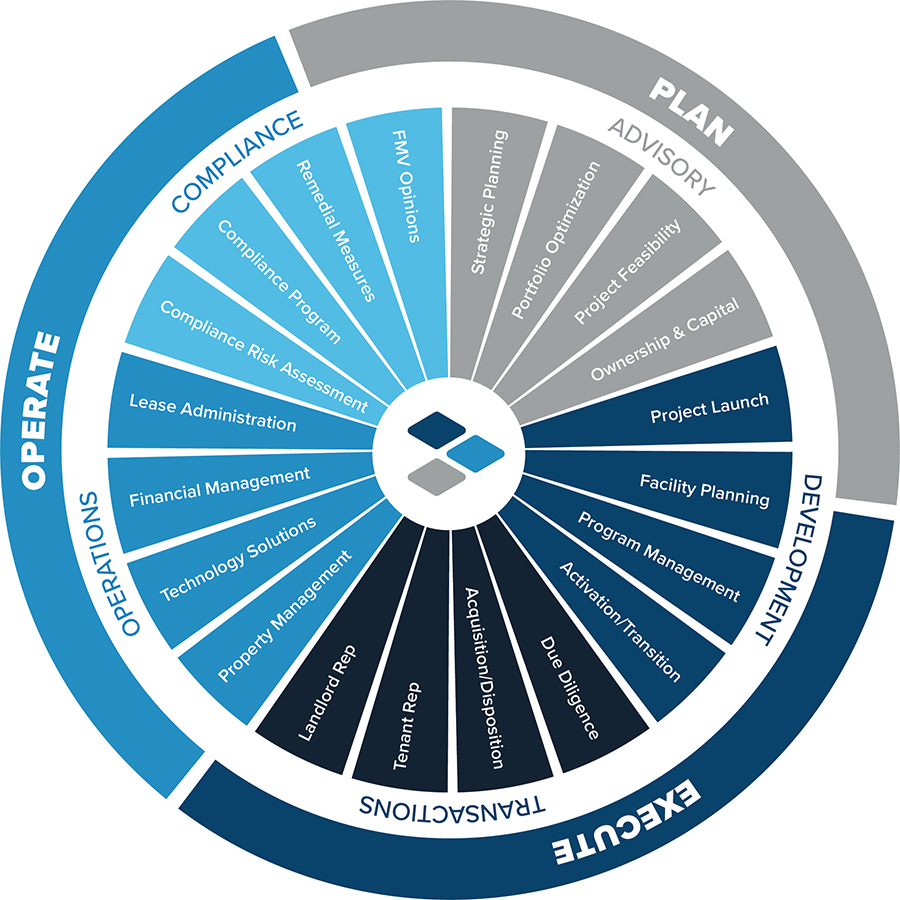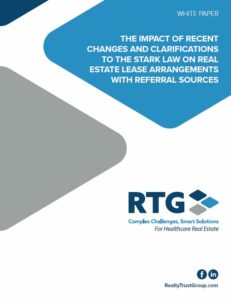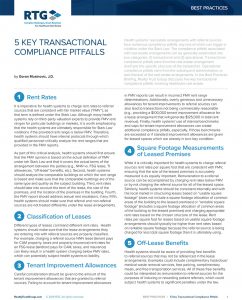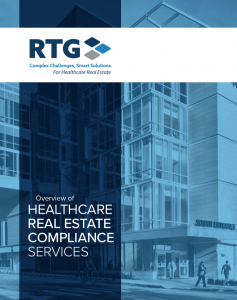
Compliance
Healthcare Real Estate Compliance Services
Healthcare real estate is a unique and complex industry—particularly regarding compliance. The Stark Law, the Anti-Kickback Statute, the False Claims Act, and other healthcare statutes and regulations create a complicated environment for health systems. A decision that is acceptable in another type of real estate transaction can result in serious violations for health systems, exposing them to significant liability and cost.
The healthcare landscape constantly changes and presents increasing competitive pressures and progressive physician alignment models. It is imperative that health systems implement effective real estate compliance programs that shelter them from regulatory infractions that result from inadequately structured, or administered, real estate arrangements with referral sources.
Realty Trust Group (RTG) provides a broad spectrum of healthcare real estate compliance services. From evaluating the structure of a new transaction, reviewing an existing transaction, or drafting and implementing compliance policies and programs, our team offers comprehensive support. We leverage our extensive healthcare experience to improve operational efficiencies, streamline processes, and identify cost-saving opportunities.
Healthcare Compliance Services


Compliance Risk Assessment
- Current State Analysis
- Operational Process Review
- Compliance Policy Review
- Lease Audit / Testing
Compliance Program Development
- Policy & Procedure Development
- Process Improvement
- Staff Training
- Issue Resolution Protocols
Remedial Measures
- Corporate Integrity Agreements
- Non-Prosecution Agreements
- Self-Disclosure Assistance
- Independent Review Organization Engagements
FMV Opinions
- Competitive Market Analysis
- FMV and CR Opinions
- Timeshare Leasing Analysis
- Litigation Support & Expert Witness
Eye on Compliance
Healthcare real estate is unique because it is subject to numerous healthcare laws and regulations. As a result, lease arrangements with referral sources present compliance pitfalls for healthcare providers, generally categorized as either transactional or operational. An effective real estate compliance program helps healthcare providers avoid the enormous costs associated with non-compliant real estate arrangements and improve the efficiency of their real estate programs—helping them provide better care to patients.
Healthcare Compliance Thought Leadership
 White Paper: The Impact Of Recent Changes And Clarifications To The Stark Law On Real Estate Lease Arrangements With Referral Sources
White Paper: The Impact Of Recent Changes And Clarifications To The Stark Law On Real Estate Lease Arrangements With Referral Sources
The recently released changes to the Stark Law went into effect on January 19, 2021 and brought several important changes and clarifications affecting real estate lease arrangements with referral sources.
In this white paper, RTG outlines key takeaways to help providers maintain real estate compliance as they structure their lease arrangements with referral sources.
 Best Practice: 5 KEY TRANSACTIONAL COMPLIANCE PITFALLS
Best Practice: 5 KEY TRANSACTIONAL COMPLIANCE PITFALLS
Real estate arrangements with referral sources face numerous compliance pitfalls, which can trigger a violation under the Stark Law. The pitfalls associated with real estate arrangements generally can be subdivided into two categories: (1) transactional and (2) operational. Transactional compliance pitfalls stem from the real estate arrangement and the transaction’s structure. Operational compliance pitfalls stem from the subsequent administration, or lack thereof, of the real estate arrangements.
In this Best Practices Briefing, RTG examines five key transactional compliance pitfalls involving healthcare real estate.
What Our Clients Say
Healthcare planning and real estate go hand in hand these days, it’s all integrated, and RTG is my “right hand person” when working on all real estate matters.
We know and have talked to some healthcare real estate firms others that are good, but they may not have the breadth that RTG has. It would be a learning curve for a new firm to get to know us. RTG knows Northside and the way we want things delivered.







